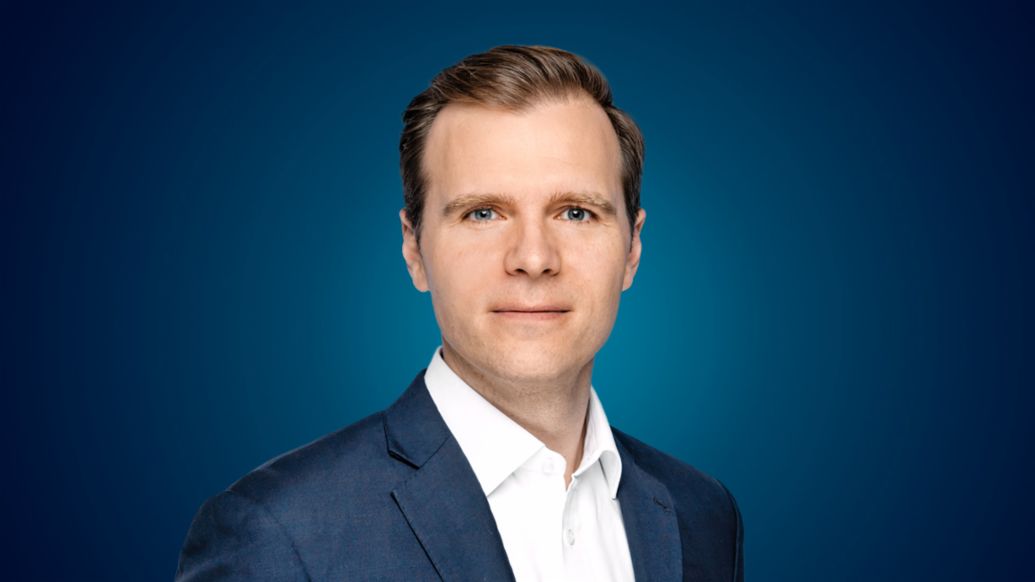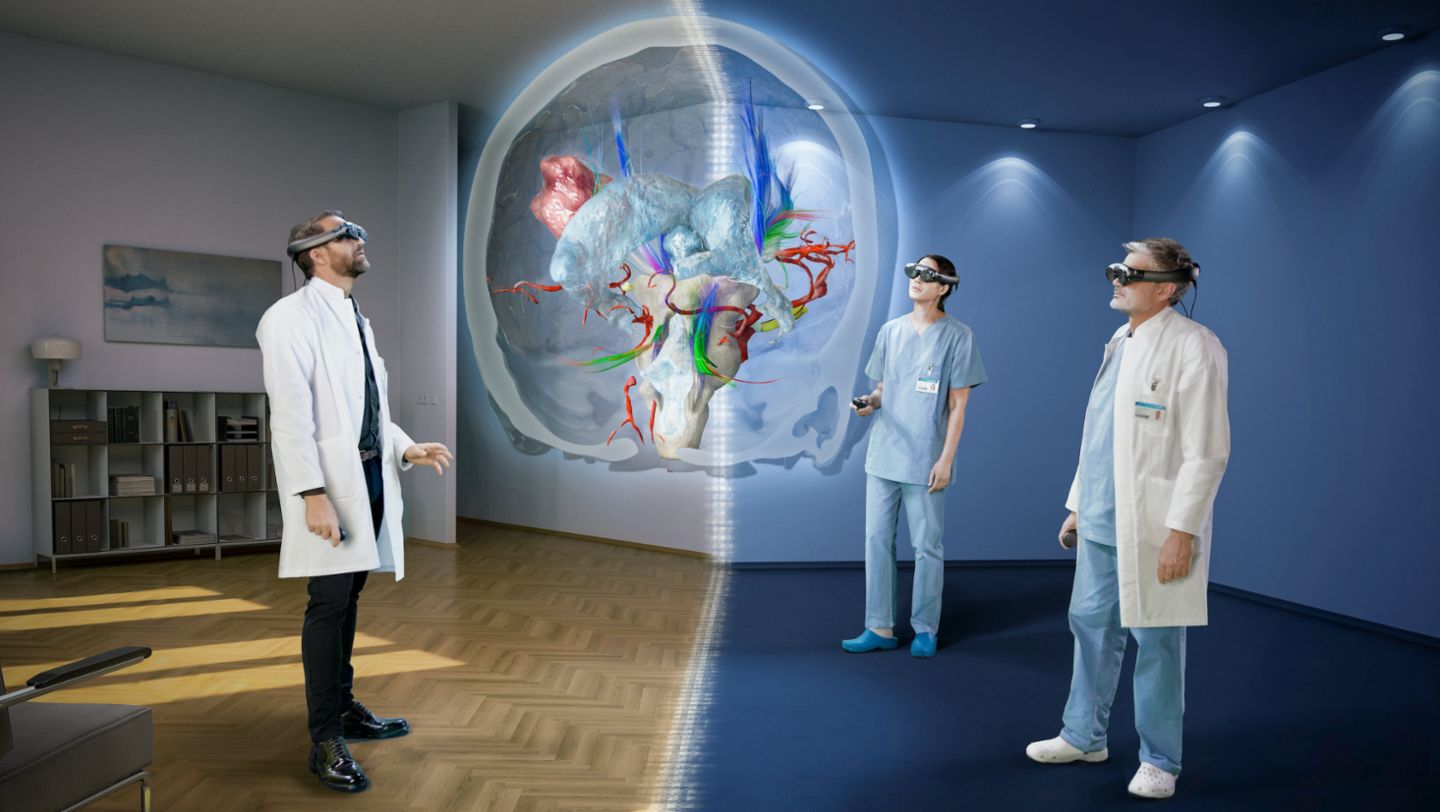The term “metaverse” is attributed to science fiction writer Neal Stephenson. In his 1992 novel Snow Crash, the protagonists have adventures not only in the analogue world but also as avatars in a digital space called the metaverse. It’s nothing new for thinkers and doers to be influenced by authors of science fiction. In fact, that stands to reason. “Everything that’s still fiction in one moment can become reality in the next,” says Dr. Martha Böckenfeld, Dean and Partner at Zurich’s Metaverse Academy, in an interview with Porsche Consulting The Magazine.
But what will the healthcare metaverse be like in the future? Will it take the form of a “digital village,” in the words of Adam Gründer, an advisor for the BPV Group? That is, will it simply be a platform where all healthcare providers are represented? And where patients can find contacts and solutions for all their healthcare needs?
According to Gründer, it will take at least a decade before a scenario of that type becomes a reality—and his forecast could well be on the optimistic side. It also raises the question of who will control the platform. “As far as German consumers are concerned, it’s surely better to have sensitive healthcare data stored on servers in their own country than with international tech companies,” he notes. People in countries with more secure and perhaps also more tech-friendly data protection frameworks than Germany might well have similar ideas. If so, could this preclude an international solution for a comprehensive platform? In Böckenfeld’s opinion the international idea remains viable, as long as a neutral organization instead of a company is charged with controlling the data platform.
For Josef Bartl, data protection is of crucial importance, but discussion about who will control this type of platform is premature. Vice President for Corporate Strategy and M&A at Brainlab, Bartl thinks an “all-encompassing parallel world in the healthcare sector” simply doesn’t make sense for the near future. In his view, the healthcare metaverse is defined not by a large and shared space but rather by the support for specific problems that comes from merging the analogue world with data. “That process opens up new opportunities,” he says. “New ways to consume information, interact with data models, and collaborate with other people in a data-supported setting.”
Expertise is coming to patients—worldwide
These types of opportunities are what need to be more sharply delineated for the healthcare metaverse to make its final breakthrough, says Alexander Nathaus, Partner for Life Science at the Porsche Consulting management consultancy. “The metaverse will only be able to develop its full potential when patients understand the concrete benefits on offer from the new digital world of healthcare.”
Nathaus has no doubts about the magnitude of potential here. “The leap in acceptance for telemedicine since the COVID crisis makes it abundantly clear that you don’t always have to visit doctors in the analogue world,” he observes. Often it can be more convenient to seek medical advice in virtual spaces. But not only that: “Virtual consultations can also make more sense if experts with relevant knowledge about a given medical issue are not available in your area.” Treatment can be guided by international experts and administered by local partners.
Nathaus points to an entire range of applications that are already shaping everyday healthcare in the metaverse. These include collaborative projects by physicians in different countries, enhanced preparations for operations, and the use of digital twins for patient consultations and medical training. “The younger generation in particular is already familiar with the metaverse, so this virtual space will be playing an ever greater role in medical settings as well.”
Investments in the healthcare metaverse should nevertheless be carefully considered. “Companies seeking success in this field should start by systematically analyzing their opportunities and assessing their specific risks, and then move on to strategic step-by-step planning,” says Nathaus. Initial analyses should devote special attention to two questions: Can the company’s specific products and services generate added value in the digital healthcare sector? And which conditions need to be met—alone or with partners—in order to steer the company’s business model into this new channel?
If companies can succeed in establishing useful solutions in the metaverse, they themselves will certainly benefit—and as so often is the case in the healthcare sector, so too will patients.
Adam Gründer: “A shared platform will take another decade”

Adam Gründer joined the BPV Group in November 2022 as Global International Advisor for Business Development. Headquartered in the western German county seat of Unna, BPV specializes in mobile workplaces, including solutions in virtual and augmented reality. He is also CEO of 10xD, an agency that develops events and other formats for the healthcare sector. Before coming to BPV, Gründer was Lead Innovation Manager at T‑Systems with a focus on metaverse, cloud, and IT solutions for healthcare. This interview was held when he was still at T‑Systems.
Adam Gründer is already a regular visitor to the healthcare metaverse—in the form of his avatar or digital persona. In his view, however, a long-term perspective is needed for the new digital space to sharpen its contours. “With an eye to the future, the best way to imagine the healthcare metaverse is as a village,” he says. When people enter this digital village—all in the form of their avatars—they have a number of different options. “Even if it’s just one platform, they can seek out very different parts of it to have medical applications or to get information.” A crucial precondition for the new digital world: “This virtual forum will have to be open to all participants in the healthcare market.”
Martha Böckenfeld: “An international organization should create a platform for everyone”

Dr. Martha Böckenfeld is a metaverse proponent who is Dean and Partner at the Metaverse Academy in Zurich, Switzerland. She teaches and advises in the fields of innovation management, digital transformation, Web3, and blockchain technology. One of the Top 100 Women of the Future and the World’s Top 200 Business & Technology Innovators, she is also active in various networks to promote professional opportunities for women. Over the course of her 20-year career in international finance, Böckenfeld has been a board member for the Winterthur Group, CEO of Kleinwort Benson, supervisory board member for Unicredit, and a member of UBS Schweiz’s board in charge of digital platforms and marketplaces.
Dr. Martha Böckenfeld’s interest in what would later be called the “metaverse” was piqued at the very latest upon donning a virtual reality headset for the first time in London in 2015. This initial virtual experience was especially formative because it dovetailed with her professional focus at the time, namely customer expectations. “What I realized right away was that this new technology would end up changing customer expectations as much as Netflix and Amazon had done previously.” She therefore resolved to learn more about it.
Josef Bartl: “The metaverse has already arrived in clinical practice”

Josef Bartl is the head of Corporate Strategy and M&A at Brainlab, a leading provider of digital medical technology based in the southern German city of Munich. He is responsible for strategic projects and transactions that further advance the company’s leading role in data-driven healthcare. Under his leadership Brainlab acquired the Chicago-based video game specialist Level Ex in 2020, which could significantly strengthen his company’s medical training portfolio. Before joining Brainlab, Bartl worked as an M&A advisor. He studied economics at Ludwig-Maximilians-Universität (LMU) in Munich.
Brainlab might be one of the German technology corporations that has been shaping the healthcare metaverse in practice right from the start. “If you look at what metaverse applications consist of today, we essentially were active in this field well before the term came into use,” observes Josef Bartl, Vice President Corporate Strategy and M&A at Brainlab.
How the metaverse improves treatment
- Bringing experts together: Medical personnel from around the world can consult in digital spaces and provide virtual support for operations.
- Preparing for operations: Hospital personnel can use holograms of their patients’ anatomy to prepare in targeted form for procedures.
- Assisting operations: Augmented reality headsets can provide surgeons with important additional information as well as step-by-step instructions if desired.
- Training: Medical personnel can receive concrete training on digital twins of CT or MRI equipment, for example, thereby freeing these high-cost and heavily booked systems for patient use. Virtual training is already being done with metaverse apps.
- Patient consultations: Medical personnel can use virtual reality headsets and 3D models to explain diseases and treatments more effectively to their patients.
- New treatments: Data collected from smartphones and wearables can enable entirely new treatments to be developed. Whether and where this succeeds will depend not least of all on data protection-related restrictions in individual countries.
- Improving outreach: A metaverse presence and avatars can improve outreach especially to younger target groups and interest them in forward-looking treatments because digital solutions are already more aligned with their lived realities.
- Remote monitoring: Healthcare personnel can use metaverse apps to continuously monitor their patients’ conditions—even if the latter are in isolated or underserved locations.
- Virtual reality treatments: Therapy sessions in virtual spaces are already taking place for psychological conditions, including anxiety and post-traumatic stress.
Info
Text erstmalig erschienen im Porsche Consulting Magazin.








.jpg/jcr:content/Header%20221205_035_Porsche_Consulting_Dr_Arno_Antlitz_Max_Arens_16_9_breiter01%20(1).jpg)

